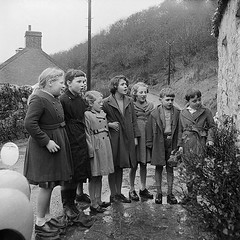
Nos desea Mónica Carretero desde Segovia.
Y yo os felicito efusivamente a todos y cada uno de vosotros con esta selección de canciones, deseos e información sobre esta celebración.
I wish U to have a
Sweetest Sunday,
Marvelous Monday,
Tasty Tuesday,
Thankful Thursday,
Friendly Friday,
Successful Saturday .
Have a great Year
HAPPY NEW YEAR!
New is the year
New are the hopes
New is the resolution
New are the spirits
And new are my warm
Wishes just for you
Have a promising
And fullfilling New Year!
THE FANTASTIKIDS & Monsieur Nô wish you "HAPPY NEW YEAR 2015"
This English children choir is made up 20 pupils from ERMITAGE, International School of France.
Los componentes del coro « los Fantaschic@s » alumnos del Colegio Pùblico y bilingüe Alhambra de Madrid nos desean feliz año nuevo con esta canción:
Traditions
England
England celebrates the New Year from the evening of December 31st into January 1st. Traditionally it is not as widely celebrated as Christmas, but the year 2000 saw a large change. For instance people did not used to celebrate New Year with fireworks (they were reserved for Bonfire Night), but last year and this all across England people were setting off fireworks on the stroke of midnight.

More traditionally, on the stroke of midnight, people open the back door (to let the old year out) and ask the first dark haired man to be seen to come through the front door carrying salt, coal and bread. This means that the following year everyone in the house will have enough to eat (bread), enough money (salt) and be warm enough (coal).
Scotland
In Scotland they always seem to celebrate New Year better than anywhere else. The celebration of New Year's Eve is called "Hogmanay". The word Hogmanay comes from a kind of oat cake that was traditionally given to children on New Year's Eve.

In Edinburgh the celebrations always include a massive party from Prince's Street to the Royal Mile and Edinburgh Castle. Unfortunately due to overcrowding in the past the event is now ticket only.
On New Year's Day (actually from the stroke of midnight) the tradition of first footing is observed. This is because the first person to set foot in a residence in a New Year is thought to profoundly affect the fortunes of everyone who lives there. Generally strangers are thought to bring good luck.
The version of Auld Lang Syne that was re-written by Robbie Byrnes, Scotland's National poet, is beloved in Scotland where it is sung on New Year's Eve while people cross hands at midnight.

We all sing Auld Lang Syne at midnight on December 31st but most people don't know that it is a Scottish poem written in 1788 by Robert Burns and later set to the music of a folk song. I've put in the English translation.
It's about connection with others. The kind that binds you to someone forever: loyalty, friendship, kindness, love. Even though that person might not be with you anymore. It's about the human spirit's ability to hope for the future while enduring rough times by remembering these precious human attributes.
Wales
New Year's Eve is called "Nos Galan" in Welsh, and they also believe in letting out the old year and letting in the new if the first visitor in the New Year is a woman and a man opens the door it's considered bad luck. In addition, if the first man to cross the threshold in the New Year is a red head, that is also bad luck.
People in Wales also believe that you should pay off all debts before the New Year begins. Tradition states that ending a year in debt means a whole new year of debt.
On New Year's Day "Dydd Calan" in Wales the children get up early to visit their neighbors and sing songs. They are given coins, mince pies, apples and other sweets for singing. This stops at midday.

it can also depend on where you live as to when you celebrate New Year in Wales. Some areas still celebrate Dydd Calan on January 12th.
Learn English
Learn English
Times Square - New York

No comments:
Post a Comment